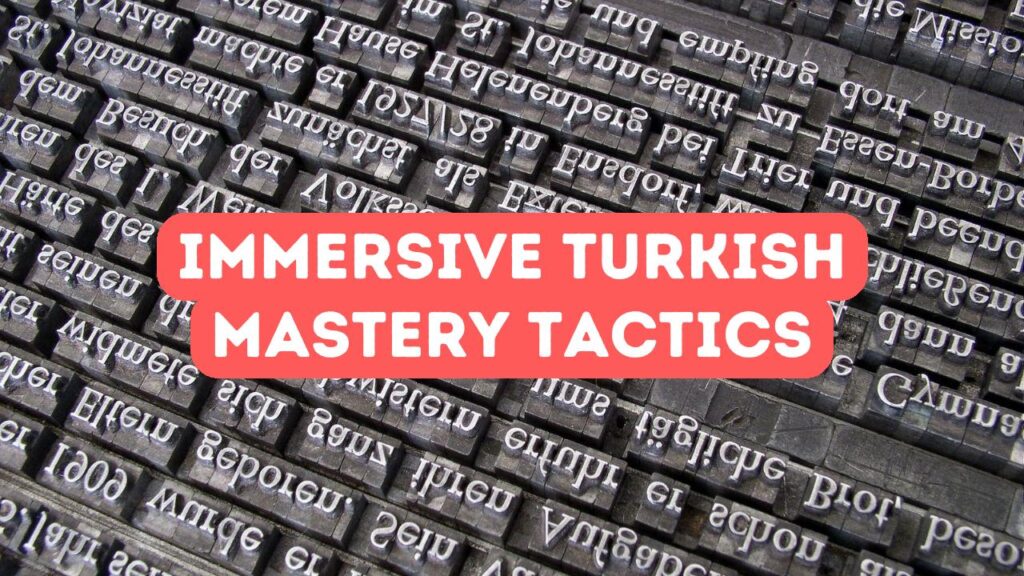Mastering Business Turkish: A Strategic Approach
To chart a course for success in the Turkish business world, one must start with a strategic approach to mastering Business Turkish. This involves not only grasping the grammatical structure and vocabulary but also understanding the context in which business terms are used. Savvy professionals immerse themselves in the language of Turkish commerce, learning to communicate with precision about topics ranging from economics to industry-specific terminology. By approaching this as a strategic learning objective, with resources like targeted language courses, professional tutors, and immersion experiences, individuals can expedite their journey toward fluency. Proficiency in Business Turkish opens doors to local market insights and conveys respect for the nuances of Turkish culture, establishing a firm foundation for meaningful business dialogues.
A critical step in mastering Business Turkish is embracing the cultural norms and social etiquette that permeate Turkish corporate environments. This includes understanding the importance of relationship-building and the value placed on hierarchy and respect. Business interactions often begin with polite conversation and an exchange of pleasantries, as trust is a cornerstone of Turkish business practices. Learning to interpret non-verbal cues and the subtleties of politeness are just as crucial as being proficient in the language itself. Furthermore, navigating negotiations or meetings with an awareness of Turkish business protocol, such as the emphasis on reciprocity and hospitality, can significantly influence the trajectory of professional relationships. The ability to engage in these practices with ease and confidence can set the stage for successful collaboration and demonstrate a genuine commitment to a lasting business partnership.
Lastly, the pursuit of mastery in Business Turkish extends to the development of strategic networking skills within Turkey’s diverse economic sectors. It is about creating a personal lexicon of industry jargon, idiomatic expressions, and technical terms that resonate with local business leaders and entrepreneurs. Adopting this specialized language demonstrates not just linguistic ability but also a deep understanding of the Turkish market’s unique attributes. Professionals equipped with this level of expertise can navigate complex negotiations, comprehend legal and financial documents, and articulate strategic objectives with confidence, thereby establishing themselves as credible and savvy players in the Turkish business arena. This linguistic dexterity, paired with cultural acumen, positions international professionals to capitalize on opportunities and forge partnerships that drive success in Turkey’s vibrant economy.
Navigating Corporate Culture in Turkey: Language as a Tool
Mastering the nuanced corporate culture in Turkey begins with the recognition that language is a gateway to mutual respect and understanding. Whether exchanging pleasantries, discussing project timelines, or engaging in intricate contractual negotiations, a grasp of the Turkish language can significantly ease these interactions. The ability to converse in Turkish allows professionals to not only grasp the explicit meaning behind words but also to detect the subtle cues and context that shape business dealings. It sets the stage for demonstrating respect for Turkish norms and practices, which is paramount in a society that places high value on personal relationships and trust. By investing time in learning the language, professionals manifest a commitment to genuine partnership, easing the path to collaboration and opening doors otherwise not available to those relying solely on translators or English-centric communication.
Taking this linguistic journey further, understanding Turkish etiquette and the importance of non-verbal communication equally affects one’s ability to navigate corporate culture proficiently. Titles and formal address are fundamental in Turkish business settings, where hierarchy is respected and adherence to protocol is expected. Professionals equipped with the appropriate Turkish vocabulary to honor these formalities experience smoother introductions and meetings, as conventional greetings and a sound grasp of salutations pave the way for polite discourse and pave the way for more favorable negotiations. Furthermore, being sensitive to gestures, maintaining eye contact, and using affirming body language are all nuanced components of communication that, when coupled with linguistic fluency, greatly enhance the effectiveness of cross-cultural exchanges and underline the respect for Turkish customs and corporate methodology.
In this vein, fluency in Turkish also equips professionals with the tools to adeptly manage conflicts and challenges that naturally arise in business endeavors. A comprehensive understanding of colloquial expressions and idiomatic language can reveal underlying intentions and assist in diffusing tension with tact and diplomacy. Proficiency in the local language fosters a more inclusive atmosphere, encouraging Turkish colleagues to engage openly and contribute valuable insights. It allows for the cultivation of rapport and can transform negotiations, steering them towards mutually beneficial outcomes. Ultimately, the marriage of linguistic skills and an appreciation for Turkish corporate culture does more than facilitate transactions; it builds enduring partnerships rooted in mutual respect and shared goals.
Effective Communication in Turkish Business Settings: A Linguistic Edge
In the bustling boardrooms and vibrant markets of Turkey, effective communication serves as the cornerstone of business success. To gain a linguistic edge, professionals must go beyond basic proficiency and master the nuances of Turkish language that resonate in the corporate sphere. This includes understanding the subtle hierarchy reflected in the language’s honorifics and titles, navigating the intricate negotiations characterized by indirect communication styles, and deploying expert-level vocabulary related to financial and industrial sectors. Mastery of these linguistic subtleties ensures not only clearer articulation of ideas and strategies but also signifies respect towards Turkish cultural norms, laying the foundation for robust and long-lasting business relationships.
Building on the essentials, achieving fluency in the Turkish business context is about grasping the art of mesajın altını çizmek, meaning to emphasize the underlying message. Turkish business communication often relies on context and non-verbal cues to convey meaning—a concept known as high-context communication. To thrive in this environment, professionals must be adept at reading between the lines and interpreting gestures, tone, and expression, all of which are integral to conveying and receiving messages accurately. Furthermore, proficiency in Turkish enables professionals to engage with local media, comprehend economic trends, and effectively participate in discussions that shape industry landscapes. Fluency therefore provides a strategic advantage, allowing for an authentic connection with Turkish colleagues, and enables one to confidently handle complex and nuanced transactions that are typical in the Turkish marketplace.
Finally, in Turkish professional environments, diplomacy and polite assertiveness are key in persuasive communication. Expert command of Turkish coupled with knowledge of cultural norms can propel negotiations and influence outcomes. Specifically, mastery in the art of ‘yumuşak güç,’ or ‘soft power,’ equips professionals with the ability to navigate through delicate situations with tact and finesse. Understanding and utilising idiomatic expressions and proverbs can also enrich arguments and presentations, endearing speakers to their audience. In essence, achieving professional fluency in Turkish is not solely about language acquisition; it is about embracing an interpersonal style that resonates with Turkish business ethos. With this linguistic edge, professionals can chart a path through the complexities of Turkey’s business world with the assurance that they are not only understood but also culturally connected.







